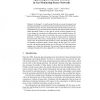Free Online Productivity Tools
i2Speak
i2Symbol
i2OCR
iTex2Img
iWeb2Print
iWeb2Shot
i2Type
iPdf2Split
iPdf2Merge
i2Bopomofo
i2Arabic
i2Style
i2Image
i2PDF
iLatex2Rtf
Sci2ools
EWSN
2008
Springer
2008
Springer
Spatiotemporal Anomaly Detection in Gas Monitoring Sensor Networks
In this paper3 , we use Bayesian Networks as a means for unsupervised learning and anomaly (event) detection in gas monitoring sensor networks for underground coal mines. We show that the Bayesian Network model can learn cyclical baselines for gas concentrations, thus reducing false alarms usually caused by flatline thresholds. Further, we show that the system can learn dependencies between changes of concentration in different gases and at multiple locations. We define and identify new types of events that can occur in a sensor network. In particular, we analyse joint events in a group of sensors based on learning the Bayesian model of the system, contrasting these events with merely aggregating single events. We demonstrate that anomalous events in individual gas data might be explained if considered jointly with the changes in other gases. Vice versa, a network-wide spatiotemporal anomaly may be detected even if individual sensor readings were within their thresholds. The presented ...
Bayesian Network Model | EWSN 2008 | Monitoring Sensor Networks | Spatiotemporal Anomaly Detection | Wireless Networks |
Related Content
| Added | 25 Dec 2009 |
| Updated | 25 Dec 2009 |
| Type | Conference |
| Year | 2008 |
| Where | EWSN |
| Authors | X. Rosalind Wang, Joseph T. Lizier, Oliver Obst, Mikhail Prokopenko, Peter Wang |
Comments (0)

